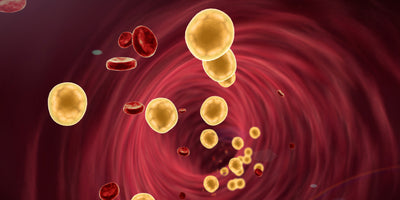
How Hydration Affects Metabolism and Appetite
Introduction
Water is the essence of life, playing a pivotal role in numerous bodily functions, including the complex processes of metabolism and the regulation of appetite. Understanding how hydration directly influences these functions can offer profound benefits for our health and well-being. This comprehensive guide delves into the multifaceted relationship between water intake, metabolic rate, and hunger signals, shedding light on why hydration should be at the forefront of health priorities.
Hydration is not just about quenching thirst; it’s about nurturing the body's foundational processes. Every cell, tissue, and organ in our body needs water to work correctly. From aiding digestion to enabling cellular energy production, water's role is irreplaceable. By exploring the nuances of how hydration affects our body’s metabolism and appetite, we can unlock strategies to optimise our health and energy levels.
The Science of Hydration and Metabolism
Water is the silent powerhouse behind metabolism, the complex network of life-sustaining chemical reactions within our bodies. These reactions convert food into energy, a process essential for maintaining our life and functions. Water facilitates these reactions, acting as a solvent where these biochemical processes occur. Without adequate hydration, our metabolism could not efficiently perform, leading to diminished energy production and overall health.
Furthermore, water assists in the transport of nutrients and oxygen to cells, enabling them to produce energy more effectively. It also helps remove waste products from the body, which can interfere with metabolic efficiency if allowed to accumulate. Thus, maintaining a well-hydrated body is synonymous with ensuring an optimally functioning metabolism, directly impacting our vitality and energy levels.
Water’s Role in Energy Production
At the molecular level, water is a key player in energy production. The hydrolysis of ATP (adenosine triphosphate) — the energy currency of the cell — is a water-dependent process. When ATP is broken down, water molecules react with ATP, releasing energy that powers cellular activities. This critical reaction underscores the importance of maintaining proper hydration to support our body's energy demands.
Moreover, water is integral to the citric acid cycle and oxidative phosphorylation, pathways in the mitochondria that produce ATP. These processes are water-intensive, requiring adequate hydration to function smoothly. By ensuring we consume enough water, we're directly fueling the cellular engines that power our bodies, highlighting the undeniable link between water intake and energy production.
Dehydration and Metabolic Slowdown
Dehydration impacts the body in numerous detrimental ways, one of which is the slowing down of metabolic processes. When the body is dehydrated, there is a reduction in blood volume, which means less oxygen and fewer nutrients are transported to the cells. This lack of resources forces the metabolism to slow down, conserving energy for vital functions. The resulting decrease in metabolic rate can lead to feelings of fatigue and decreased physical performance.
In the long term, a consistently slow metabolism due to chronic dehydration may contribute to weight gain. The body’s ability to metabolise fat is compromised without sufficient water, as lipolysis (the breakdown of fats) requires water molecules. Therefore, staying hydrated is not just about preventing immediate discomfort but is also crucial for maintaining a healthy metabolic rate and supporting weight management efforts.
Hydration and Thermogenesis
Water-induced thermogenesis is a fascinating aspect of metabolism where drinking water leads to an increase in metabolic rate. Studies have shown that consuming cold water can enhance metabolic rate temporarily, as the body expends energy to warm the water to body temperature. This process, while not a significant calorie burner, illustrates the metabolic benefits of regular water consumption.
The effect of water on thermogenesis also extends to the digestion process. Drinking water with meals can increase the thermic effect of food, the energy required for digestion, further boosting metabolism. This suggests that integrating adequate water intake with meals not only aids digestion but can also contribute to a slight uptick in metabolic rate, showcasing the metabolic advantages of staying well-hydrated.
The Impact of Hydration on Appetite and Satiety Signals
The body’s mechanisms for signaling hunger and thirst can sometimes overlap, leading to the common mistake of confusing thirst for hunger. This confusion can result in overeating when the body actually requires water, not food. By staying adequately hydrated, we can help our body more accurately signal its true needs, potentially preventing unnecessary calorie intake.
Additionally, water consumption before meals has been shown to reduce overall food intake in some individuals. Drinking water fills the stomach, promoting a sense of fullness and reducing appetite. This can be a useful strategy for those looking to manage their calorie intake for weight loss or maintenance. Proper hydration, therefore, plays a direct role in managing hunger and promoting satiety, making it a critical component of appetite control.
Hydration and Fat Oxidation
Water’s influence extends to the process of fat oxidation, a key component of weight management and metabolic health. Adequate hydration facilitates the efficient breakdown of fats into usable energy. A well-hydrated state ensures that the enzymatic activity involved in breaking down fat for fuel operates optimally. Conversely, dehydration can hamper this process, slowing down fat oxidation and potentially hindering weight loss efforts.
Moreover, studies suggest that increased water intake is associated with enhanced lipid metabolism, implying that drinking sufficient amounts of water could encourage the body to use fats as an energy source more effectively. This relationship between hydration and fat oxidation underscores the importance of water in weight management strategies and overall metabolic health.
Fluids and Digestive Health

Water is essential for maintaining a healthy digestive system. It facilitates the breakdown of food so that the body can absorb nutrients more effectively. Additionally, water is crucial for forming stool and preventing constipation. Regular bowel movements are vital for expelling waste and toxins from the body, with hydration playing a key role in ensuring digestive regularity.
The absorption of water-soluble vitamins (such as vitamins B and C) and minerals also relies on adequate hydration. These nutrients dissolve in water, making it easier for the digestive system to absorb them into the bloodstream. Thus, proper hydration not only supports the mechanical aspects of digestion but also enhances the body's ability to absorb and utilise essential nutrients.
Hydration, Physical Performance, and Recovery
Hydration status significantly impacts physical performance and recovery. During exercise, the body loses water through sweat, which can lead to dehydration if fluids are not adequately replaced. Dehydration can result in decreased endurance, increased fatigue, and a higher risk of heat-related illnesses. Adequate water intake before, during, and after exercise helps maintain optimal physical performance and prevents the adverse effects of dehydration.
Recovery is another critical phase where hydration plays a vital role. Water helps transport nutrients to muscles, aiding in repair and growth. It also helps flush out metabolic waste products accumulated during intense physical activity. By staying hydrated, athletes and physically active individuals can enhance recovery processes, reduce muscle soreness, and improve readiness for subsequent workouts.
Optimal Hydration Strategies for Metabolic Health
To achieve optimal hydration, it’s essential to understand that individual needs vary based on factors such as age, weight, climate, and activity level. A general guideline is to aim for 8-10 glasses of water per day, but specific needs can differ. Listening to your body’s cues, such as the color of your urine, can provide personalised indicators of hydration status; clear or light-colored urine typically signifies good hydration.
Incorporating water-rich foods into your diet, such as fruits and vegetables, can also contribute to overall fluid intake. Additionally, establishing a routine of drinking water at regular intervals, especially before meals and during physical activity, can help maintain consistent hydration levels. For those who struggle with water intake, flavoring water with natural ingredients like lemon or cucumber can make it more appealing, encouraging regular consumption.
The Interplay Between Diet, Hydration, and Metabolism
The beverages we choose play a significant role in our hydration status and metabolic health. While water should be the primary source of hydration, other beverages like herbal teas and clear broths can also contribute positively. Conversely, sugary drinks and alcohol can lead to dehydration and have adverse effects on metabolism, including increased calorie intake and impaired fat oxidation.
The quality of our diet also influences hydration; a diet high in salt and processed foods can increase the body’s need for water. Meanwhile, consuming a balanced diet rich in whole foods can naturally support hydration and metabolic health. Understanding the impact of dietary choices on hydration is crucial for optimising metabolic processes and maintaining overall health.
Summary
The Essential Role of Water in Metabolism:
- Water facilitates biochemical reactions necessary for energy production.
- Adequate hydration ensures smooth metabolic processes and energy efficiency.
- Water is crucial in the hydrolysis of ATP for energy release.
- It supports mitochondrial processes for ATP production, emphasising the importance of hydration for cellular energy.
- Dehydration leads to a decrease in metabolic rate, affecting energy levels and weight management.
- Chronic dehydration can slow down fat metabolism, contributing to weight gain.
- Drinking water can temporarily boost metabolism through thermogenesis, as the body works to heat the water.
- Incorporating water with meals enhances the thermic effect of food, aiding in metabolic rate increase.
- Proper hydration helps differentiate between hunger and thirst signals, aiding in appetite control.
- Drinking water before meals can promote satiety and reduce overall calorie intake.
- Sufficient water intake is necessary for efficient fat breakdown and energy use.
- Studies link increased water consumption with improved lipid metabolism, supporting weight management.
- Water aids in nutrient breakdown, absorption, and regular bowel movements, essential for digestive health.
- Adequate hydration enhances the absorption of water-soluble vitamins and minerals.
- Hydration is key to maintaining endurance, reducing fatigue, and preventing heat-related illnesses during physical activity.
- Water facilitates nutrient transport to muscles and the removal of metabolic waste, crucial for recovery.
- Individual hydration needs vary; aiming for 8-10 glasses of water daily is a general guideline, adjusted by personal factors.
- Consuming water-rich foods and establishing regular water-drinking routines can help maintain hydration.
- Choosing water and hydrating beverages over sugary drinks and alcohol is vital for hydration and metabolic health.
- A balanced diet, low in salt and processed foods, supports optimal hydration and metabolic processes.







